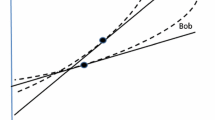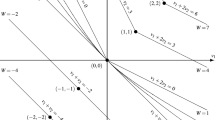Abstract
The Pareto principle is often in conflict with the equity criteria in construction of social preferences: there exist two allocations x and y such that x Pareto dominates y, but y is an equitable allocation whereas x is not. The efficiency-first principle requires to rank an allocation x higher than y if (i) x Pareto dominates y or (ii) x and y are Pareto-noncomparable and x is equitable whereas y is not. The equity-first principle reverses the order of application of the two criteria. Adopting egalitarian-equivalence as the notion of equity, we examine rationality of the social preference functions based on the efficiency-first or the equity-first principle. The degrees of rationality vary widely depending on which principle is adopted, and depending on the range of egalitarian-reference bundles. We show several impossibility and possibility results as well as a characterization of the social preference function introduced by Pazner and Schmeidler (1978). We also identify the sets of maximal elements of the social preference relations in the set of feasible allocations. The results are contrasted with those in the case where no-envy is the notion of equity.
Similar content being viewed by others
Author information
Authors and Affiliations
Corresponding author
Additional information
This paper is a much extended version of a part of Tadenuma (1998). The author is grateful to Marc Fleurbaey, Serge-Chiristophe Kolm, Kotaro Suzumura, and William Thomson for helpful comments on the earlier version of the paper. ‘‘Financial support from the Ministry of Education, Culture, Sports, Science and Technology of Japan for the 21st Century Center of Excellence Project on the Normative Evaluation and Social Choice of Contemporary Economic Systems is gratefully acknowledged’’.
Rights and permissions
About this article
Cite this article
Tadenuma, K. Egalitarian-equivalence and the Pareto principle for social preferences. Soc Choice Welfare 24, 455–473 (2005). https://doi.org/10.1007/s00355-003-0310-2
Received:
Accepted:
Issue Date:
DOI: https://doi.org/10.1007/s00355-003-0310-2




